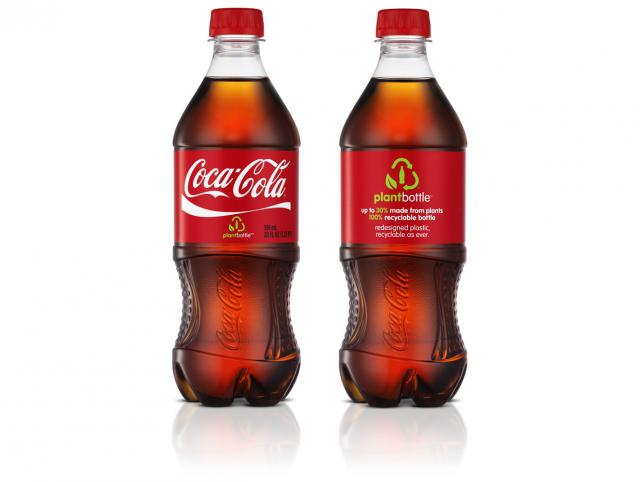5 green packaging trends that are here to stay
Looming climate change global environmental instability are becoming nearly impossible to ignore these days, and consumers have taken notice. With demand for sustainably-conscious products and product packaging constantly increasing, retail brands from Coke to Calgon have begun to offer and promote sustainable, environmentally-friendly, “green” packaging to help shoppers decrease their environmental impact. With the new year underway, here are five of the most exciting and innovative trends in sustainable consumer packaging our Charlotte marketing agency will be keeping a collective eye on over the next little while.
 1. Plant-based plastics
1. Plant-based plastics
Plant-based plastic production is on the rise, and companies like Virent and Renmatix are helping to lead the way in the efficient production of plastics from renewable sourcee. A good example is the partnership between some huge brand names like Coca-Cola, Nestle and Nike and the World Wildlife Fund in establishing the Bioplastic Feedstock Alliance (BFA), a collaboration aimed at setting standards for and guiding the development of plant-based plastics derived from feedstocks like corn and sugar cane. Formed late in 2013, BFA and other sustainably-minded companies are betting that virgin plastics and less sustainable materials will largely disappear from packaging and product manufacturing over the next few years. BFA and similar bioplastic trends show a lot of potential, and may help prove that our dependence on petroleum-derived plastics isn’t as hidebound as we once thought.
2. “Greener” coffee pods
The market for single-serve coffee pods is huge on both sides of the Atlantic, amounting to a multi-billion dollar industry. While convenient for consumers, the waste these little single-serve containers generate creates a  huge problem, given that the most common style of coffee pod is comprised of plastic, an aluminum lining or lid, and a filter – a product that cannot be easily recycled. Thankfully, coffee and tea pod producers are helping to solve the problem by designing more eco-friendly products that can even be composted. Biome Bioplastics is one such company, designing coffee pods comprised of plant-based materials and resources that meet international composting standards. Other company products, like Canterbury Coffee Company’s OneCoffee pod, or a tea pod developed by Republic of Tea, are paving the way with more biodegradable solutions to this huge waste stream.
huge problem, given that the most common style of coffee pod is comprised of plastic, an aluminum lining or lid, and a filter – a product that cannot be easily recycled. Thankfully, coffee and tea pod producers are helping to solve the problem by designing more eco-friendly products that can even be composted. Biome Bioplastics is one such company, designing coffee pods comprised of plant-based materials and resources that meet international composting standards. Other company products, like Canterbury Coffee Company’s OneCoffee pod, or a tea pod developed by Republic of Tea, are paving the way with more biodegradable solutions to this huge waste stream.
2014 is sure to see a surge in the popularity of these more environmentally-conscious products as more firms begin to realize both their environmental and marketing value. According to the Wall Street Journal, it is estimated that nearly 9 billion single-serve pods are sold annually, which highlights just how huge the waste stream is and continues to grow ever year.
3. LiquiGlide
In 2012, MIT researchers and engineers unveiled a simple, yet revolutionary development in food packaging: LiquiGlide. LiquiGlide is a food-safe, slippery coating that can be applied to the inside of nearly any condiment, food, or viscous liquid-containing product bottle, allowing consumers to get every last drop of food or other product from their respective bottles (without, obviously, using their tongues).
Videos surrounding the unveiling of the new technology showed researchers pouring ketchup out of a glass bottle coated with LiquiGlide with no visible ketchup residue remaining in the bottle. Considering the EPA found that in 2011 only 4 percent of food waste was diverted from landfills, this new technology presents an incredible opportunity to reduce some of the most basic sources of global consumer food waste. Not only is LiquiGlide food-safe, but it has been approved by the FDA and is completely nontoxic. Now that the slippery coating has had time to prove itself, 2014 is sure to see more brands showing an interest in partnering with LiquiGlide.
4. Corporate responsibility
Over 80 percent of consumers are mindful of how sustainable the products they buy reportedly are. This has massive implications for companies and firms aiming to target the broad appeal of consumers across numerous industries, and further highlights the importance of true corporate responsibility when it comes to being environmentally and sustainably-conscious. A driving example of perpetuating corporate responsibility, the Sustainable Packaging Coalition – operated by nonprofit GreenBlue – started the How2Recycle Label project, allowing for brands to voluntarily sport How2Recycle Labels on their products. The labels not only detail what each component of a product’s packaging is made of, but also if each material can be recycled, and special instructions for materials not widely recycled in communities. The Kellogg Company, Minute Maid and Ziploc are among many companies that are willingly partnering with the program, and in the near future, that list is expected to only get larger. As consumers continue to demand more sustainable products, corporate entities will be pressured into following efforts similar to the How2Recycle project in order to show their consumers how environmentally conscious they really are.
corporate responsibility, the Sustainable Packaging Coalition – operated by nonprofit GreenBlue – started the How2Recycle Label project, allowing for brands to voluntarily sport How2Recycle Labels on their products. The labels not only detail what each component of a product’s packaging is made of, but also if each material can be recycled, and special instructions for materials not widely recycled in communities. The Kellogg Company, Minute Maid and Ziploc are among many companies that are willingly partnering with the program, and in the near future, that list is expected to only get larger. As consumers continue to demand more sustainable products, corporate entities will be pressured into following efforts similar to the How2Recycle project in order to show their consumers how environmentally conscious they really are.
5. Less is more
Manufacturers have been phasing out glass packaging in favor of rigid plastic alternatives for quite some time now. But consumers and manufacturers alike want to go one step further – to make product packaging even smaller lighter, and with fewer materials. For years already, innumerable bottled water brands have been making the shift towards lowering the amount of plastic contained in their 16.9-oz water bottles, and more brands and products are following suit. Heinz rolled out a 10-oz pouch of its tomato ketchup several years ago, lowering both the cost of production and cost to consumers. These new innovations in packaging design allow manufacturers to save on material resources, while passing on those savings to consumers.
been making the shift towards lowering the amount of plastic contained in their 16.9-oz water bottles, and more brands and products are following suit. Heinz rolled out a 10-oz pouch of its tomato ketchup several years ago, lowering both the cost of production and cost to consumers. These new innovations in packaging design allow manufacturers to save on material resources, while passing on those savings to consumers.
Take, for example, the AstroPaq pouch. Our marketing agency Charlotte loves this green packaging technology for several reasons, especially the delicious adult beverages contained therein. So what’s not to love? The contents chill much faster than when stored in a wine bottle (14 min vs. 40), and with only 2% packaging by weight, one truck load of empty AstroPaq pouches equals 14 truckloads of empty glass bottles.


